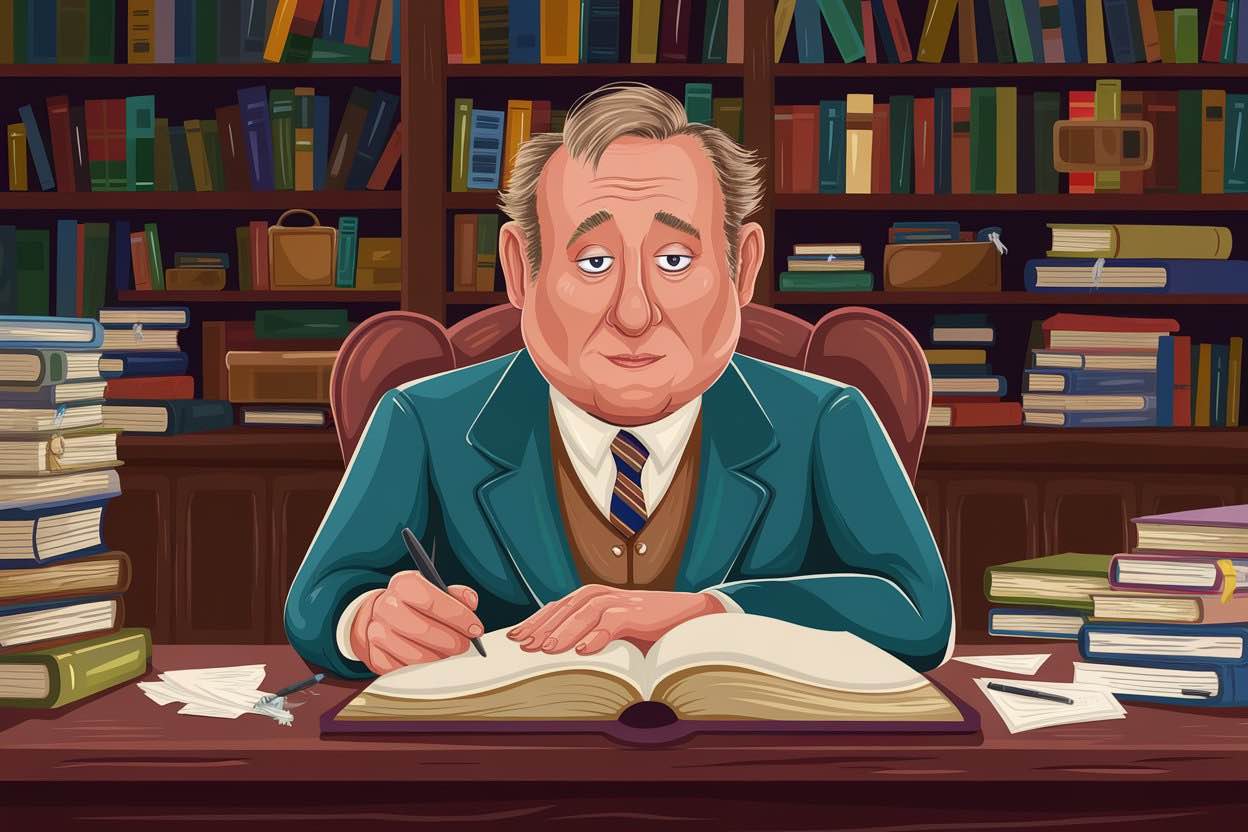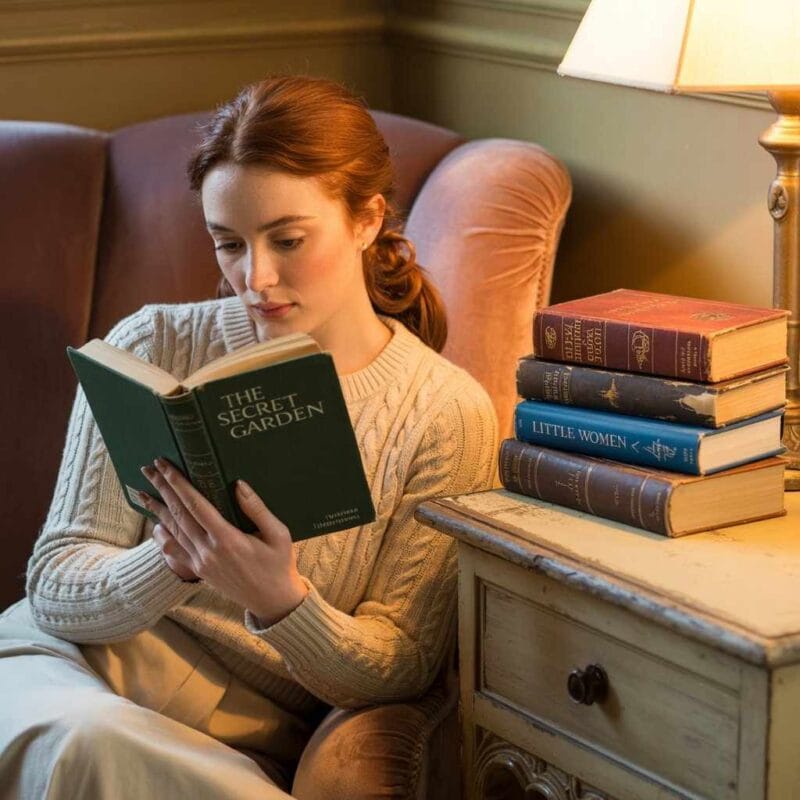- Evelyn Waugh, born as Arthur Evelyn St. John Waugh on October 28, 1903, was a prominent English satirical novelist of the 20th century. Influenced by his father, a publisher, and his education at Lancing College and Hertford College, Oxford, Waugh’s early works like Decline and Fall and A Handful of Dust established his reputation for sharp societal critiques. His novel Brideshead Revisited offered a detailed portrayal of the British aristocracy, further solidifying his literary status.
- Waugh’s literary career encompassed various genres, including travel writing and journalism. His major works include:
– Decline and Fall
– Vile Bodies
– Brideshead Revisited
– Sword of Honour trilogy - Themes in his works often revolved around:
– Satirical critiques of British society
– Exploration of faith and redemption
– Impact of World War II - Waugh’s contributions to literature remain impactful, with his works continuing to be studied for their wit, social commentary, and stylistic complexity.
Evelyn Waugh, an English writer born as Arthur Evelyn St. John Waugh on October 28, 1903, stands as one of the most notable satirical novelists of the 20th century. His works are an intricate blend of wit and critique, capturing the essence of the times he wrote about.
From his early days, Waugh was immersed in the world of literature, influenced by his father, a publisher, and his education at Lancing College and Hertford College, Oxford. His literary career began with satires such as Decline and Fall (1928) and A Handful of Dust (1934), where his unique style quickly established him as a master in the genre. These works encapsulate his biting critique of society’s institutions and values.
His remarkable use of irony and humor allowed Waugh to explore topics that might otherwise be disregarded, granting insight into the human condition through a distinctly British lens. His novel, Brideshead Revisited, published in 1945, further solidified his reputation, offering a detailed portrayal of the British aristocracy and its complex dynamics. It is this novel that continues to capture the imagination of readers and scholars today.
While his works reflect the times in which he lived, their enduring appeal lies in this ability to transcend those contexts. As his readers navigate the pages of his novels, they are invited to see Waugh’s world through his sharply observant eyes. Waugh’s sharp satire and astute observations of society remain relevant, making his writings a source of both entertainment and reflection.
Biography and Early Life

Waugh was born into a family with a strong literary background, which influenced his eventual path as a writer. His early years included education at prestigious institutions and initial career experiences that shaped his work.
Childhood
He was born on October 28, 1903, in London, England. His father, Arthur Waugh, was a respected publisher and literary critic, which provided a nurturing environment for Evelyn’s early interest in literature. As the second son in the family, Waugh experienced a mix of independence and expectation. His early writing endeavors began in childhood, showing a keen interest in storytelling and creativity.
Education at Lancing and Hertford College, Oxford
Waugh’s education began at Lancing College, Sussex, where he developed his skills in writing and art. He later attended Hertford College, Oxford, where he expanded his literary pursuits and connected with future influential figures. During his Oxford years, he became involved in various social circles, exposing him to diverse experiences that he later drew upon in his writing. His time at Oxford refined his literary style.
Early Career and Marriage
Following his education, Waugh embarked on a brief teaching career, which he found unsatisfying. He attempted to pursue art but eventually settled on writing as his primary focus. During this period, Waugh married Evelyn Gardner, a union that ended in divorce, impacting his personal life and professional endeavors. Despite early setbacks, Waugh published his first novel, Decline and Fall, in 1928, marking the beginning of his literary career.
Literary Career
Before becoming an eminent English writer, Waugh gained recognition through his mastery of satire and a multifaceted literary career. His early works offer keen insights into social mores, while his travel books and journalism reflect his broad experiences and observational skills.
First Publications and Satire
Waugh’s literary career began with the publication of Rossetti: His Life and Works (1928), a biography of Dante Gabriel Rossetti. However, his breakthrough came with the novel Decline and Fall, also published in 1928. Decline and Fall was a commercial success and showcased his satirical prowess. Shortly thereafter, Waugh published Black Mischief (1932) and A Handful of Dust (1934), further establishing his reputation as a prominent satirical voice.
Vivid character portrayals and sharp critiques of British society were common themes. Waugh’s satirical novels often explored upper-class absurdities, using humor to critique social conventions. Many of these early works remain relevant, reflecting enduring societal features.
Travel Books and Journalistic Endeavors
Beyond fiction, Waugh also pursued travel writing and journalism, which influenced his literary style. His journeys resulted in publications such as Remote People (1931), Ninety-Two Days (1934), and Waugh in Abyssinia (1936). These travel books captured his observations and experiences abroad, often with characteristic wit and insight.
As a journalist, Waugh contributed articles to various publications, providing firsthand accounts of political upheavals and cultural exchanges. His ability to incorporate different cultures into his writing enriched both fictional and nonfictional works.
Major Works and Recognition
Among Waugh’s major works, Brideshead Revisited stands as one of his most celebrated novels, delving into themes of loyalty and faith. His prowess as a writer was further exemplified by Scoop (1938) and Put Out More Flags (1942), where sharp wit and incisive commentary were pervasive.
Waugh’s later novels, such as The Loved One (1948) and The Ordeal of Gilbert Pinfold (1957), showcased versatility in storytelling. Helena (1950), a historical fiction, diverged from his usual satirical flair, demonstrating his range and creativity.
Waugh’s literary contributions earned him recognition as one of the finest writers of his era, and his works continue to be studied and admired for their stylistic complexity and satirical sharpness.
Major Works Breakdown
Decline and Fall Analysis
This satirical work follows Paul Pennyfeather, a hapless student at Oxford, whose life spirals due to a series of unfortunate events. Known for its incisive humor, the novel critiques the upper classes and educational institutions of the time.
This early work establishes Waugh’s talent for satire, showcasing his ability to weave humor with commentary on human follies. The characters are exaggerated portrayals, emphasizing the absurdities he observed in contemporary society. The novel remains a testament to Waugh’s early exploration of satire and social critique.
Vile Bodies and Its Influence
Vile Bodies, released in 1930, delves into the lives of the “Bright Young Things” in interwar England. The novel combines satire with a fast-paced narrative to depict the hedonism and superficiality of this group. It explores themes of celebrity culture and the fleeting nature of youth and success.
The work’s sarcastic tone and vivid characters left a mark on future depictions of this life stage, influencing literature and popular culture. Waugh critiques the emptiness of societal pursuits, encapsulating the energy and instability of the time. This influence extended beyond literature, impacting the portrayal of youth culture in various media.
Critical Reception of Brideshead Revisited
Brideshead Revisited diverged from Waugh’s earlier satirical works, offering a more poignant look at nostalgia and Catholicism. The novel chronicles Charles Ryder’s relationship with the aristocratic Flyte family, capturing the decline of the English nobility and themes of faith and redemption.
The critical reception of Brideshead Revisited was mixed. Some praised its elegance and depth, while others critiqued its perceived sentimentality. Despite this, the novel achieved lasting success, becoming a celebrated classic. The work continues to be studied for its rich character development and reflections on societal changes in postwar Britain.
Themes and Writing Style

Catholicism and Spiritual Themes
Waugh, a convert to Roman Catholicism, often infused his works with spiritual themes. His faith significantly influenced his writing. Brideshead Revisited is one notable example where the influence of the Catholic Church is prominent, as are themes of redemption and divine providence. The novel dives into the complex dynamics of a Catholic family and their struggle with faith.
Waugh’s fascination with historical and religious themes is evident in his novel Helena (1950), a work that delves into the life of the Roman empress, showcasing his interest in intertwining fiction with historical narratives. In Edmund Campion (1935), he examines the life of a Catholic martyr, reflecting his interest in religious history. Waugh’s friendships, such as with Ronald Knox, further enriched his understanding of Catholic philosophy, permeating his literary pursuits.
Commentary on Society
Waugh employed satire to critique the Bright Young Things, a moniker for the young, carefree elite of the 1920s. His Vile Bodies is a sharp satire that examines this group’s lives. Waugh dissects their frivolous pursuits and superficial lifestyles with biting humor and irony.
In A Handful of Dust, he underscores the emptiness behind the facades of the British upper class during the early 20th century. Through these portrayals, he insightfully critiques societal values, revealing the absurdities and contradictions within these social constructs.
World War II Impact

Waugh’s experiences during World War II significantly shaped both his military service and his literary works. His contributions to the British Army, as well as his subsequent literary reflections, provide a unique perspective on the war.
Military Service
Waugh served in the British Armed Forces during World War II, ultimately rising within the ranks to become an officer. Despite his physique being considered atypical for a soldier, his time in the Royal Marines and the Royal Horse Guards demonstrated his commitment.
Waugh’s involvement with the British Army included participation in operations in Crete and with the Yugoslav Partisans. Despite some personal dissatisfaction with his military role, these experiences offered him insights into the chaos of war, a theme evident in his writings.
Literature During and Post War
Waugh’s experiences in the Second World War profoundly influenced his writing, resulting in the renowned Sword of Honour trilogy. Comprising Men at Arms (1952), Officers and Gentlemen (1955), and Unconditional Surrender (1961), this series reflects Waugh’s personal wartime experiences and the sense of disillusionment he witnessed.
Through his protagonist, Guy Crouchback, Waugh examines themes of honor and duty within the British Armed Forces. These novels not only capture the challenges of a soldier’s life but also critique the bureaucracies and inefficiencies encountered in wartime environments.
Waugh’s reflection on World War II through his Sword of Honour trilogy stands as a testament to the profound effect that the war had on his literary creations.
Later Life and Lasting Legacy

In the later years of his life, Waugh’s literary output remained prolific, venturing into memoir and autobiography. Notably, A Little Learning (1964), his unfinished autobiography, offers insights into his formative years. The Diaries of Evelyn Waugh (1976) and The Letters of Evelyn Waugh (1980) provide further glimpses into his personal and professional experiences, reflecting the complexities of his character.
His reputation as a writer endured beyond his death on April 10, 1966, bolstered by adaptations of his works. The television serial adaptation of Brideshead Revisited remains a significant cultural artifact, reintroducing Waugh’s themes to new audiences.
Biographies by scholars like Martin Stannard and Douglas Lane Patey have been instrumental in exploring his life and works. This includes examining his relationships with contemporaries such as Harold Acton and Brian Howard, enriching the understanding of his personal and professional dynamics.
Art and aesthetics were also integral to Waugh’s legacy, highlighted by his appreciation for the Pre-Raphaelite Brotherhood and Victorian paintings. This is reflected in his novelistic style and thematic choices.
Despite facing personal challenges, including mental breakdowns, Waugh’s contributions to literature remain impactful. His exploration of human nature, societal transitions, and religious motifs continues to resonate, securing his place in literary history.
Further Reading
Evelyn Waugh: The Best and the Worst by Charles J. Rolo, The Atlantic
Ninety years on, what can we learn from reading Evelyn Waugh’s troubling satire Black Mischief? by Naomi Milthorpe, The Conversation
Evelyn Waugh is laughing at you by Will Lloyd, The New Statesman
Evelyn Waugh Biography by Anthony Domestico, Yale University




